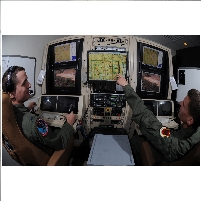The Strange World of Killing by Remote Control
Thursday, October 29, 2009
 Drone pilot training at Creech Air Force base (Air Force photo/Nadine Y. Barclay)
Drone pilot training at Creech Air Force base (Air Force photo/Nadine Y. Barclay)
“Combat as shift work” is proving to have its own psychological problems for the men and women who remotely pilot the Predator and Reaper drones used in the Afghanistan and Iraq wars. Sitting safely in control rooms thousands of miles away from the actual combat has not removed the Air Force crews from experiencing fatigue or burnout, or emotional stress stemming from being so close to home while waging war. While conventional pilots go off to war and don’t see their families for months, drone pilots live at home and drive to work like civilians, then return home at night after a long day of bombing Taliban or al Qaeda fighters.
“We have 5,000 years of one type of warfare and only a couple of years of this new kind,” P.W. Singer, author of Wired for War: The Robotics Revolution and Conflict in the 21st Century, told Stars and Stripes. “These guys are simultaneously at home and at war. It may be that human psychology isn’t designed for that. We don’t know yet.”
Drone pilots perform in a variety of situations, including providing reconnaissance for U.S. troops on the ground by looking for possible explosive devices and surveying terrain for insurgents in hiding, and by operating actual bombing missions. Unlike fighter pilots who leave the area as soon as they have dropped their bombs, drone pilots continue to survey the area for the aftermath of a mission, which can sometimes include the unintentional killing of civilians.
It is only recently that the Air Force has acknowledged that drone pilots at Creech Air Force Base outside of Las Vegas, even though they are physically 8,000 miles away from the battlefield, are experiencing combat stress. Creech has brought in its own chaplain corps and provides counseling for pilots, as well as others in the “kill chain,” including the sensor operators who control the drone’s camera and are responsible for holding the guiding laser on a target. Pilots and sensor operators often work intense 12-hour shifts…and then drive home to their families, with whom they are not allowed to discuss their missions.
-David Wallechinsky, Noel Brinkerhoff
The War Room: Daily Transition Between Battle, Home Takes a Toll on Drone Operators (By Megan McCloskey, Stars and Stripes)
Air Force to Train More Computer Pilots than Aircraft Pilots (by Noel Brinkerhoff, AllGov)
- Top Stories
- Unusual News
- Where is the Money Going?
- Controversies
- U.S. and the World
- Appointments and Resignations
- Latest News
- Musk and Trump Fire Members of Congress
- Trump Calls for Violent Street Demonstrations Against Himself
- Trump Changes Name of Republican Party
- The 2024 Election By the Numbers
- Bashar al-Assad—The Fall of a Rabid AntiSemite






Comments